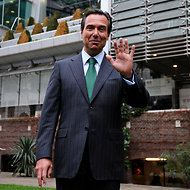6:17 p.m. | Updated The Treasury Department said on Sunday that it plans to sell an additional $18 billion worth of shares in the American International Group, more than halving the government’s stake in the bailed-out insurer.
If completed, the offering would be the Treasury Department’s biggest divestiture yet of its holdings in A.I.G. It be nearly double the “re-I.P.O.” of May 2011, in which the government sold $8.7 billion worth of shares.
And it would reduce the government’s stake to well below 50 percent, a long-sought goal for both the insurer and the government. After the offering is completed, the Treasury Department would hold about 23 percent.
As part of the offering, A.I.G. has offered to buy back up to $5 billion of the shares sold. And should demand prove stronger than expected, the offering’s underwriters can expand the size of the sale by $2.7 billion, further reducing the government’s stake.
The latest stock sale is the latest move by the federal government to disentangle itself from one of its most significant bailouts from the financial crisis of 2008, in which A.I.G. received a $182 billion lifeline. The Treasury Department has already announced a number of stock offerings, beginning in May of 2011, that have whittled its stake in the insurer from 92 percent.
And last month, the Federal Reserve Bank of New York announced that it had sold off the final set of risky bonds that it had acquired from A.I.G. as part of the bailout. Collectively, the sale of those securities reaped about $9.4 billion in proceeds for taxpayers.
Treasury’s latest offering is being led by Citigroup, Deutsche Bank, Goldman Sachs and JPMorgan Chase.
Article source: http://dealbook.nytimes.com/2012/09/09/treasury-to-sell-18-billion-worth-of-additional-a-i-g-shares/?partner=rss&emc=rss
